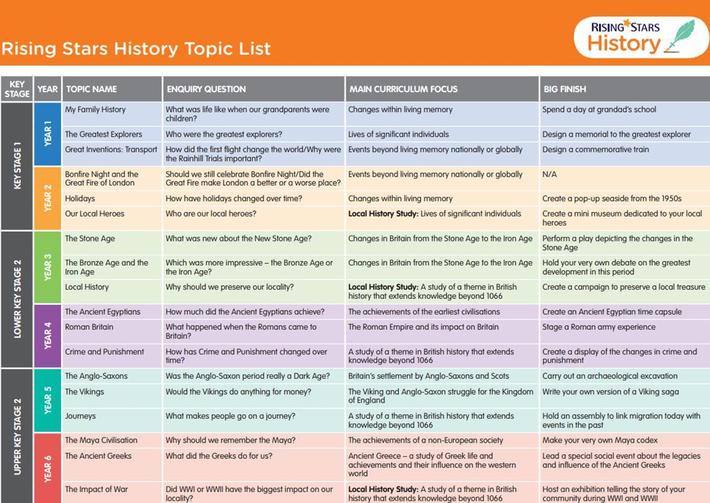History
National Curriculum: Alf Wilkinson on History
Alf Wilkinson of the Historical Association explains the changes to the primary history curriculum.
Winston Churchill announcing Germany's unconditional surrender
Subscribe to Iconic: http://bit.ly/zVEuIY Winston Churchill announcing Germany's unconditional surrender.
VE Day celebrations
Watch this compilation of film from IWM Archives, showing thousands of people gathered outside Buckingham Palace on VE Day, local celebrations at King's Lang...
VE Day Resources
- VE_Day_and_WW2_KS1_Paula_Kitching (1).docx
- VE_Day_and_ww2_KS2_Paula_Kitching.docx
- VE_Day_and_WW2_ppt_Paula_Kitching.ppt
History Progression
History Overview

| Autumn 1 | Autumn 2 | Spring 1 | Spring 2 | Summer 1 | Summer 2 |
| Geography | History | Geography | History | Geography | History |
Rising Stars History is a complete curriculum programme for primary history which provides 18 half-termly units of work to ensure pupils gain a coherent knowledge and understanding of Britain’s history, their locality and the history of the wider world. It offers complete coverage of the National Curriculum Programme of Study for History (2014) and supports meeting the criteria of the new Ofsted Education Inspection Framework (2019).
From starting points suitable for all, the units develop to provide appropriate challenges for KS1 and KS2 pupils of varying abilities. The units have key questions to develop the use of historical enquiry, as well as a focus on the acquisition and application of key subject knowledge, concepts and vocabulary throughout. Skills, knowledge and understanding in history progress through Year 1 to Year 6, being taught, developed and applied throughout the schemes of work.
A range of opportunities are provided to enable all pupils to communicate their knowledge and understanding of the subject. Links are made within and across units to support pupils in making connections and in developing a strong overview of chronology, breadth and local to global history. Rising Stars History offers complete coverage of the National Curriculum Programme of Study for History (2014). See the Topic List at the end of this document for the titles of the units, the enquiry questions, the curriculum foci, and the Big Finishes.
More detail about coverage is given in the KS1, Lower KS2 and Upper KS2 Curriculum Coverage and Progression Charts (available online). All the units provide coverage of the National Curriculum Programme of Study statements to some extent, however certain units provide a key focus and some an assessment task that can be utilised to gather further evidence on progress, and these are indicated on the charts. The charts also contain expected standards for each statement at each year group, enabling teachers to track the course of progression through the scheme from start to finish.
Discovering Stone Age tools made of flint | History - Ancient Voices
An archaeologist explores the importance of flint to Stone Age man. A modern day worker makes a replica of a Stone Age arrow, showing us how skilled people w...
What do ancient bones tell us about the Stone Age? | History - Ancient Voices
Exploring ancient burials through the 'Red Lady of Paviland', one of the oldest skeletons found in Britain, which dates back 30,000 years. Subscribe for more...
Stone Age farming and homes | History - Ancient Voices
A clip looking at the Old Stone Age, and hunter-gatherers who lived by hunting animals and collecting fruit and nuts. We also explore the first farmers, who ...
Discovering metalwork in Bronze Age Britain | History - Ancient Voices
Archaeologist Raksha Dave visits Butser Ancient Farm to look at the beginning of the Bronze Age, and construct an axe head in exactly the same way Bronze Age...
What does Stonehenge gold tell us about the Bronze Age? | History - Ancient Voices
Archaeologist Raksha Dave explores Maiden Castle - the biggest Iron Age Hill Fort in Britain. Subscribe for more History clips from BBC Teach on Thursdays wh...
